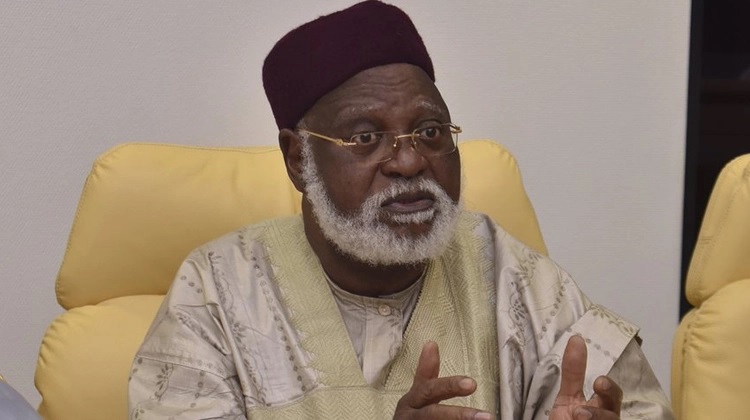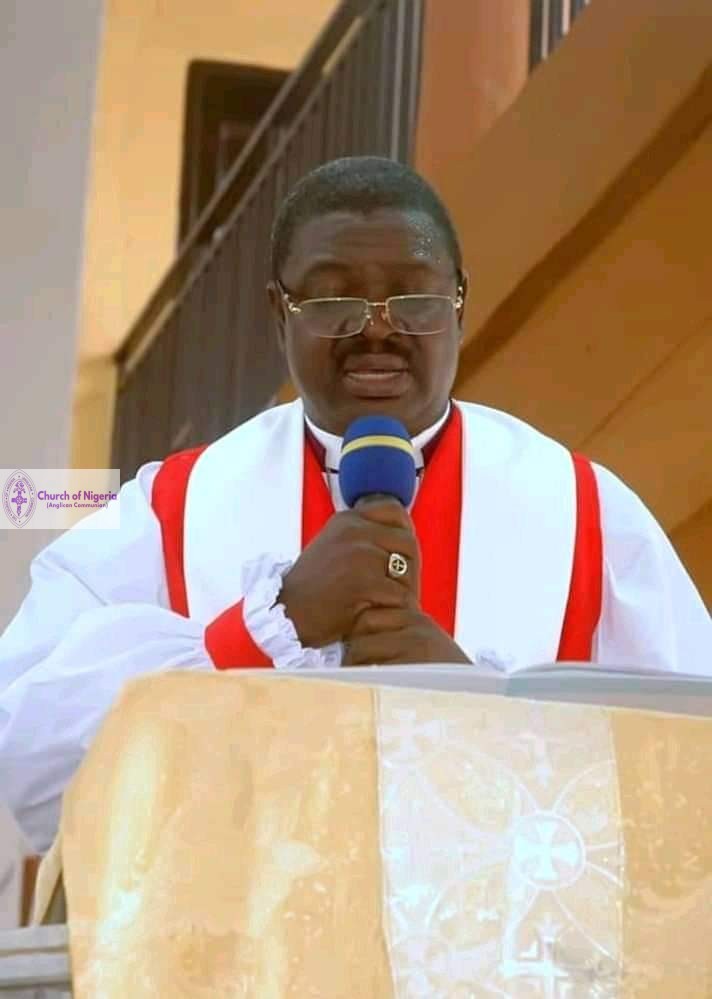- RURAL EVANGELISM: NEW GENERATION CHURCHES SHOULD STEP OUTSIDE THEIR POSH SETTINGS
- CHRISTIANITY IS MORE THAN JUMPING UP AND DOWN
- WHY I MAINTAINED MY ‘IFA’ NAME
Right Reverend (Dr) Stephen Ayodeji Fagbemi, the General Secretary of the Church of Nigeria (Anglican Communion), consecrated Bishop of the Anglican Diocese of Owo, enthroned as Bishop of Owo Diocese on November 1, 2017.
He speaks with RITA OKONOBOH on his experience in the ministry since he was ordained in 1990, and how orthodox churches can work with today’s youths.
BRIEF about background
I was born into the Anglican Communion. My father, now of blessed memory, was a member of the church. My mother is also a very active member of the church. I grew up at Oba-Ile in Akure North Local Government Area of Ondo State. I attended St. John Anglican Primary School, then Ejioba High School, both in Oba-Ile. My early days were spent in Oba-Ile. When I left secondary school, 31 years ago, that was when I joined the ministry. I was posted to be an agent-catechist in Holy Trinity Anglican Church, then in Ogbo, now Araromi. I was posted to pastor the church for about a year before I went to train fully at the Emmanuel College of Theology and Christian Education in Ibadan. I obtained a Diploma in Religious Studies of the University of Ibadan and Diploma in Theology from Emmanuel College, before I was ordained in 1990. It was after my ordination, I went to train at St. John’s College, Nottingham, then, attended the University of Nottingham, in the United Kingdom.
Why did you decide to go into the ministry?
Actually, in my case, I felt really called to it. I didn’t really set out to join the ministry. Initially, the plan was to go to a university after my secondary school education, to study Political Science or Business Administration, and my father was very supportive of that. It was halfway through the journey of the admission process that I began to think that I probably was going in the wrong direction. Besides, everything about me was drawing me towards the ministry. At that time, I was already a licensed lay reader in my home church at St. John’s Church, Oba-Ile. But I wasn’t thinking of anything beyond being a lay reader. However, I felt the calling to go into the ministry full-time, because I felt God was calling me to share the Good News. That was when I decided to go into the ministry, instead of going to the university, at the time. In fact, when I took that decision, my father wasn’t happy. Besides, going into the ministry was hardly to make money, nor was it a lucrative venture, in terms of financial rewards. My father thought that as a cleric, one would be required to wait on people’s goodwill, so he really wasn’t particularly excited. It took quite some time and the intervention of leading members of the community, especially my father-in-the-Lord, who was my vicar then, Professor Akin Omoyajowo, now a retired bishop, before my father finally agreed. It took many months before he finally agreed to support me. I thank God that I have found satisfaction joining the ministry.
Your surname, Fagbemi, has allusions to the Ifa oracle tradition. It is not uncommon to find clerics and Christians, sometimes wanting to change their names to reflect their Christian leaning. Have you ever considered changing yours to say, Oluwagbemi, for instance?
Not at all. I believe very strongly that it is my root. If I suddenly change my name to Oluwagbemi, for instance, then I belong to nobody. The truth is that it wouldn’t be my father’s name. The fact that I hold on to the name Fagbemi would reflect my roots. Although, my forebears did not serve the Christian God that I serve today, that I have come out of that to serve the living God, for me I believe is gospel enough – that we have been called out of darkness into God’s marvellous light. In fact, the name is enough a sermon to preach.

In September 2016, you were appointed the General Secretary of the Anglican Communion. Barely a year after that, you were elected a bishop. How did you receive the news of your election as a bishop?
It was a very humbling experience for me. I felt very humbled by the fact that they could even think about me, or call me this soon. It was unexpected. I had barely settled as the general secretary, and if you ask me, all I was thinking of, was the activities for the office of the general secretary. So, being elected bishop was a surprise. It’s a miracle, and I think God has a funny sense of humour. I wondered why he took me from Akure, all the way to Abuja, before taking be back to Owo. That’s God. The experience also reminds me of an earlier story of my life. When I finished my doctorate degree, I was serving in the Diocese of Canterbury, at the Church of England, in Kent. I was working in a town, about 16 miles outside of Canterbury, in the South-East of England. When God would give me another job to do in the church, He took me from the South-East to the North-East of England. When the time came, He took me straight from the North-East of England, straight down to Akure. It has been funny, the way things have worked out, and I have agreed to obey God.

There have been concerns about the declining youth population in Orthodox churches, which has been attributed to various reasons including social media presence, mode of worship, among others. Do you also share concerns that Orthodox churches in Nigeria may become extinct?
Well, I suppose, humanly speaking, it is reasonable to express that fear. However, for those of us just coming into the episcopacy, we don’t want to preside over empty churches. However, I have come to see beyond that. The church is God’s and I am confident that He will sustain the church. The orthodox church, to be fair, is the church for this land. Over the years, since 1842, we have served Nigeria. We have moved from village to village, from city to city, gone into the interior of this country, establishing schools. So, it is not the kind of church we find only in the urban centres, as is the case with some of the new generation churches, where you have to be posh all the time. We are in the cities and villages, as well. The gospel of the Anglican Church, and some of the mainline churches, is the gospel that is relevant, that speaks to the life of the people. Young people are usually caught up with new ideas, and they think that it is all there is to life. When real challenges come, many of them drift easily, because there is no strong foundation. Our church tells you the reality – that life can be tough. But we will also tell you that Christ will be there for you when things get tough, and He will uphold you and see you through. Some of these new generation churches tell you things get tough when a person has sinned. In fact, some of them tell you there is no place for challenges in a person’s life. But even the scriptures tell us that there will be tribulation. In fact, many of those who left many years ago are finding their way back because they know that we are accountable, and involve them in ways to move the church forward and to do God’s business. Christianity is more than jumping up and down. When the test really comes, how does one hold up? We will continue to pray that people will see the truth. Let new generation churches also reach the unreached with the gospel, rather than recycle members. Are we evangelising to new members or simply recycling those who have already been saved? My message for the church now is that we should go out for real evangelism – get new people into the kingdom of God.
What ways would you suggest to make services more attractive for youths?
Some of our churches are already encouraging the youths by giving them regular slots to lead during services. When I was vicar in one of the churches in Owo diocese, those around me were largely youths and probably, whenever, I wasn’t preaching, you might find that the person on the roster was a youth. And a good number of them, at least five of them, have been ordained and are serving in the church in various places. We need to give them a voice. Let them also take opportunities to lead. The church should also identify their problems and look for ways to address them. Youths also need to be properly grounded in the teachings of scripture and understanding the church. They must really know why the Anglican Church does some things. The church is thoroughly biblical. From the beginning of the service to the end, everything is in the Bible. The church needs to teach more understanding, so that they will know it’s not just about singing and dancing, but that it’s about your spirituality, your life with God, and your response to the saving grace of God. The church is exploring all ways to ensure that we minister to youths, but I will caution the church. Let’s not do any business that will not honour God, simply because we want to have members at all costs. Let us do what is God’s will and serve God in a way that will honour Him.
You were dean of the Archbishop Vining College of Theology before you became general secretary of the Church of Nigeria (Anglican Communion). With your experience in a system that has trained clerics, why do you think Nigeria’s large population of pastors does not seem commensurate with high moral standards?
That’s an interesting question. You know we have just been talking about the ‘Chicken Republicisation’ of religion in Nigeria. It’s now fast food Christianity many people are interested in. For the clerics we train, they go through rigorous training, Nowadays, many of these churches are doing business instead, giving motivational talks on how people can be successful. So many things have crept into the church now, some positive, some negative. You see a pastor who says he is a banker at weekdays, and a pastor on Sunday, and what he does is to want to apply banking principles to the church. We have people who never went for training, who now become pastors, prophets, prophetesses, and the like, and they say all kinds of things. So, in the process, all kinds of things will come in. It is a shame that many Christians nowadays want to grab and grab, and are not ready to give. We should be ready to give out to the society, so that society can change for the better. By the grace of God, for the clerics we train, as humanly possible as we can, we ensure that they understand what they are called to do – to teach the balanced gospel. We encourage them to be faithful pastors, to preach the gospel to make positive impact.
Since you were ordained 27 years ago, what would you say has been your most memorable experience in the ministry?
The greatest motivation for me was the challenge of preaching the gospel. Perhaps, one of the most memorable experiences I had was the very first sermon I preached after my ordination as a deacon. That sermon was taken from Romans 6: 1-11. This was in July 1990. I remember preaching that sermon with such passion. Then I made an altar call at the end of the sermon. There was absolute silence in the church. It was new to have altar call during the 10am service. Nobody came out. For, me, I knew God had started something wonderful in the church. I prayed for the people and continued with the service. After the service, three people came to me quietly and said they wanted to respond to the preaching but found it difficult, because it was new to the church. So, we prayed together, and we started meeting for Bible study. We had more people join the Bible study and so many other things started to happen within the church. For me, it’s so memorable to see the journey all through and to see that God has been bringing people into the kingdom, through the preaching we do. The opportunity to stand before the people and minister God’s word is something I take very seriously and that has continually motivated me. Today, if you make the same altar call, people will come out without fear. So many other things the Lord has done, and for me, the opportunity to share the good news of Christ’s salvation is something I always rejoice in.





